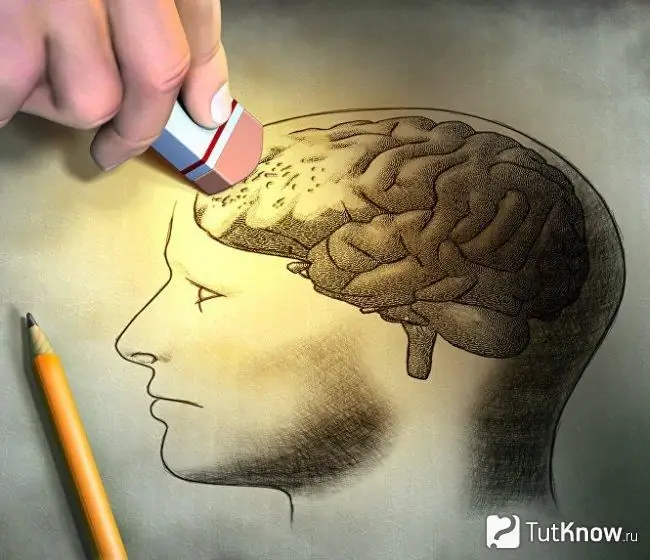What is called false memory, the history of the study, the reasons for its appearance, types and psychology, how pseudo-memory affects people's lives. If bouts of pseudo-memory are rare, they do not have much of an impact on an individual's life. But if they are repeated often, this is an indicator of unhealthy processes in the life of the body, in particular the brain. In this case, they speak of a painful memory disorder.
Manifestations of false memory as a mental disorder

When false memories prevail in a person's memory, one should talk about false memory syndrome (SLS). It defines all aspects of an individual's life. And this is already a violation of the processes of memorization, a painful manifestation, which doctors call paramnesia, which in translation from Greek means “wrong memory”. Often occurs with neuropsychiatric diseases caused by external (exogenous) factors. And it is provoked by psychoses resulting from various diseases of internal organs or intoxication of the body.
The manifestations of paramnesia include such memory impairments as:
- False vague memories (pseudo-reminiscences) … Real events of the distant past, usually they relate to personal life experience, are perceived as occurring in the present. Let's say a person experienced a burning resentment in childhood. It constantly burned the soul and led to an unexpected painful effect: it began to be perceived as having happened recently. Such memory impairments are manifested in various diseases of the central nervous system and are characteristic of people of mature age.
- Invalid stories (contabulation) … There is a certain similarity here with pseudo-reminiscences. The only difference is that what happened in the past is not only transferred to the present, but also "diluted" with fictitious stories. Fantasies appear that, for example, he went for a walk in the forest, and aliens stole it. Sometimes fictions are accompanied by delirium, an attack of visual and auditory pseudo-hallucinations. They are found in schizophrenics, drug addicts, alcoholics, with an overdose of psychotropic drugs, in those suffering from senile dementia.
- Fantasy Dreams (Cryptomnesia) … This is a painful condition when, for example, a novel you read or a movie you watch becomes an integral part of life. The opposite effect: it seems to a person that it was his life that was described in a book or shown in a motion picture. He gets used to this thought and lives in his illusory world, considers himself his hero. A type of such a mental disorder is jamevue - not recognizing the previously known. May appear in old age or in schizophrenia.
- Consciousness "inside out" (phantasms) … Consciousness suddenly turns fantasized events into reality. This actually did not happen, but it seems that what happened in reality.
It's important to know! Paramnesia is a painful memory disorder. It is a consequence of a serious illness that is subject to treatment and psychotherapeutic correction.
Features of false memory manipulation

Memory has its own gray areas. Experts know about this, it is not for nothing that in recent years heated discussions have flared up, whether it is possible to interfere with the human psyche, forcing him to remember what, perhaps, was not at all in his life. Such manipulations with memory, when suddenly something that was not in reality is "remembered", can have far-reaching consequences not only for a specific individual, but also for society as a whole.
The psyche tends to give out false "marks", which for various reasons (sometimes sincerely, and more often slyly) people take for what really happened to them. This is evidenced by cases from the life of famous people. For example, Marilyn Monroe often recalled that she was raped at the age of 7. But the name of the rapist was different every time.
German film star Marlene Dietrich also loved to talk about being raped at 16 by her music teacher. And she even called his name. But the journalists found out that in her school years, he did not even live in Germany.
It is likely that both Marilyn Monroe and Marlene Dietrich truly believed in their stories and took them seriously. Then it is nothing more than phantasm, a kind of paramnesia. Or perhaps they were just being cunning. Society empathizes with people who have been victims of violence. Famous beautiful women have such a miserable life! One can only sincerely sympathize and pity them.
This is one of the phenomena of false memory. On the other hand, it can provoke hatred and even discord between loved ones. There are cases when already grown-up children went to court, accusing their parents that they mistreated them in childhood. On this basis, scandals took place. The parents accused the children that it was all fiction. Close people parted as enemies.
So can a person be forced to remember their past? The psychotherapist can push to remember the smallest details of what happened a long time ago that have “floated away” from consciousness. Is this necessary after many years, and are such memories accurate? Why invade the human psyche, because none of the specialists really knows what harm manipulation of memory can bring.
It has been noticed that if you constantly instill in a person any false thought, it, in the end, will be perceived as true. This has long been used by political strategists and successfully imposed on society the point of view of the party for which they work. People believe, and then puzzledly scratch the back of their heads that they have elected, for example, to parliament, not those deputies at all.
Another case is when historical events are misinterpreted. If the media from day to day impose on the population a point of view that is pleasing to the authorities, it becomes "the ultimate truth." The people begin to believe in it, but they consider a different view to be false.
This is quite consistent with the so-called Mandela effect, when the collective memory is based on false historical facts. Named for the South African politician Nelson Mandela. Many people in the West believed that he died in prison. Although the politician was released and even became the president of South Africa.
For example, today the Great Patriotic War is denied in Ukraine at the state level. The view is imposed that for the Ukrainians it was only World War II. And many believed in this sacredly. So, driving false postulates into people's memory, history is being rewritten.
It's important to know! False memory is an important ideological factor in political struggle. Methods of informational and psychological processing of people's attitudes are built on it. What is false memory - look at the video:

False memory is a poorly studied phenomenon of the human psyche, an insufficiently known psychological phenomenon, when an individual "recalls" events that did not actually occur. Such memories can be attributed to a defensive reflex, a person's reaction to the unknown, in order to protect themselves from a possible stressful situation or to arouse compassion and compassion. On the other hand, deliberate manipulation of public consciousness turns people into an obedient herd. Let's say that historical facts and events (recent or "things of bygone days") misinterpreted by the media become a false collective memory. The consequences of such aggressive intervention in the human psyche can affect the life of the individual and society in the most unforeseen way.





